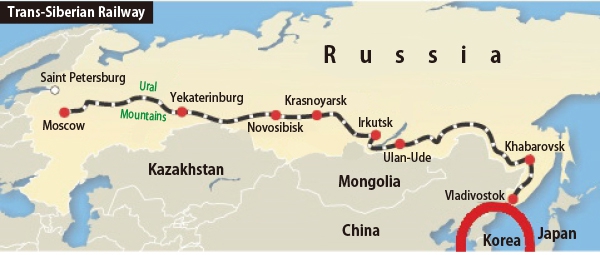 |
|
Trans-Siberian Railway
|
Agreement expected to positively influence Moon’s Northeast Asian Railway Community
It was recently reported in the Japanese Yomiuri Shimbun that the Russian and Japanese governments have agreed on a plan to build a freight route between the two countries that will pass through the Trans-Siberian Railway (TSR). In his August 15 congratulatory address, President Moon Jae-in proposed his Northeast Asian Railway Community initiative, while it appears that Japan is also interested in a continental railway project. The August 18 article in the Yomiuri Shimbun quoted a source on Russia-Japan diplomatic relations who claimed that “field tests” would be conducted using the TSR to transport freight around the time of the Eastern Economic Forum, which is to be held on September 11-13 in Vladivostok. Japanese Prime Minister Shinzo Abe will attend the Eastern Economic Forum, and is scheduled to hold a summit meeting with Russian President Vladimir Putin. Between five and ten Japanese logistics companies will take part in the field tests, with the goal of determining the cost, time and customs and export procedures for transporting freight between the two countries through the TSR. There is also a plan to verify the impact of vibrations, temperature differences and other factors on goods transported to Europe via the TSR. The movement of goods between Japan and Russia currently relies on shipping and air freight, with no overland transport, as the procedures involved in overland transport via the TSR are complicated and there is a lack of information about them. When freight is sent from Tokyo to Moscow via shipping routes, it must pass through the Indian Ocean, the Suez Canal and the Mediterranean Sea before returning via Western Europe. This process takes between 53 and 62 days. By sending freight to Vladivostok, the port city located in the Russian Far East, and transferring the goods to the TSR, this period could be more than halved, dropping to between 20 and 27 days. According to the Japanese Ministry of Finance, automobiles accounted for 44 percent of Japanese exports to Russia last year, with automobile parts making up a further 12 percent. From the other side, coal and LNG made up 27 percent and 20 percent of Russian exports to Japan respectively. However, Japan is not only interested in the TSR project for economic reasons. Japan believes that strengthening economic cooperation with Russia is necessary for solving a territory dispute between the two countries over the four southernmost isles of the Kuril Islands (called the Northern Territories in Japanese). Russia has also demonstrated keen interest in the proposal from the perspective of boosting the Far East economy. In 2016, a Japanese media outlet reported that the Russian government had asked Japan to “construct a trans-continental railroad linking Sakhalin and Hokkaido, as an extension to the TSR.” It is expected that greater railway cooperation between Japan and Russia will have a positive influence on the Northeast Asian Railway Community initiative put forward by President Moon. By Cho Ki-weon, Tokyo correspondent Please direct comments or questions to [english@hani.co.kr]






